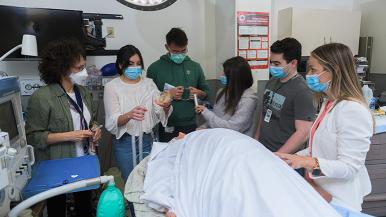Illinois currently faces a staggering health care challenge: 15,000 unfilled nursing positions. Rush University College of Nursing is pioneering a transformative solution, now funded by a groundbreaking $2 million grant from The Grainger Foundation.
Christine Kennedy, PhD, RN, FAAN, John L. & Helen Kellogg Dean of the College of Nursing and interim provost of Rush University, emphasizes the urgency of tackling the nursing shortage.
“The demand to enter the nursing profession is soaring, yet the barriers to meeting this demand are formidable,” Kennedy says. “We are turning away potential nurses at an alarming rate. The Grainger Foundation's support is a game-changer, providing the means to break through these barriers and make a lasting impact on nursing education."
The generous funding will support Rush's Generalist Entry Master of Science in Nursing program through an innovative approach to simulation learning, addressing critical barriers to nurse education and significantly increasing enrollment. Designed for career-changers who want to enter the nursing profession, the GEM program prepares students with a bachelor’s in another field and attracts individuals from backgrounds underrepresented in the field.
The driving force behind enrollment challenges at nursing colleges across the U.S. lies in the scarcity of clinical training opportunities where students obtain hands-on experiences required for licensure — a hurdle exacerbated by the ongoing shift from inpatient to outpatient care. Simulation training emerges as a promising solution, allowing students to fulfill 25% of their clinical hours in a controlled setting. With The Grainger Foundation's funding, the Rush Center for Clinical Skills and Simulation will see a substantial expansion to its programming, doubling student learning hours and creating a model for other nursing schools to emulate.
"Simulation learning represents an incredible asset for nursing education at Rush,” says Kennedy, who envisions this commitment having a broader impact. “With The Grainger Foundation's support, we aim to not only grow our GEM program but also share our successful simulation practices with other institutions. It's a win-win for the nursing profession and, ultimately, patient care."
The $2 million grant is strategically allocated to three vital components:
- Expansion of Simulation Programs: The grant will more than double student hours in Rush’s simulation center, expanding training and enhancing important clinical skills.
- Faculty Support for Curriculum Development: To overhaul the curriculum and maximize simulation integration, the grant will support a new faculty member in the College of Nursing, Director of Simulation Learning, who will also contribute to applied research in the field.
- Increased Clinical Instructor Support: As the program grows, Rush will hire additional clinical instructors to support students' needs.
Projected over the next five years, Rush anticipates a 40% growth in the GEM program’s enrollment, aiming to matriculate at least 200 students annually. The success of this endeavor will be measured through critical metrics such as NCLEX pass rates, student satisfaction and faculty perceptions of learning outcomes.
"This isn't just about meeting our immediate needs; it's about creating a sustainable, self-sufficient program that will continue to produce highly skilled nurses for years to come," Kennedy says.
The Grainger Foundation is a longstanding supporter of Rush, with previous commitments fueling innovations in Rush’s comprehensive stroke center, faculty research in psychiatry and orthopedics, and the establishment of student scholarships.
As Rush embarks on this promising initiative, The Grainger Foundation's visionary support is poised to reshape nursing education, creating new pathways to prepare more well-trained nurses for the future health care landscape.
The Grainger Foundation is an independent private foundation based in Lake Forest, Illinois. It provides substantive support to a broad range of organizations including educational, medical, cultural, and human services institutions.




